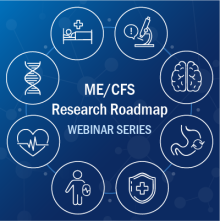Background
In 2019, the National Advisory Neurological Disorders and Stroke (NANDS) Council Working Group for myalgic encephalomyelitis/chronic fatigue syndrome (ME/CFS) presented the Report of the NANDS Council Working Group for ME/CFS Research(pdf, 669 KB). In 2022, as part of the strategic planning process outlined in the report, NINDS announced the development of a Research Roadmap for ME/CFS, which identified research priorities to move the field toward translational studies and clinical trials.
The roadmap was informed by a new working group, which will include ME/CFS basic and clinical experts from the research community, leaders of ME/CFS non-profit advocacy and research organizations, as well as people with lived experience (i.e., individuals with ME/CFS, those with a family history of ME/CFS, caregivers/care partners, and/or patient advocates). The working group met regularly in 2023 and 2024 to discuss and develop a Research Roadmap for ME/CFS.
Members of the Trans-NIH ME/CFS Working Group and staff from the NINDS Office of Science Policy and Planning and the NINDS Office of Neuroscience Communications and Engagement coordinated the activities of the ME/CFS Research Roadmap Working Group. The roadmap was presented at the NANDS Council meeting on May 15, 2024. A recording of the Council meeting is on NIH videocast.
Charge of the Committee
The new NANDS Council Working Group will develop a research roadmap to provide scientific guidance to the NANDS Council on how best to advance research on ME/CFS. Consistent with the charge, the working group:
- Assessed current ME/CFS research activities and identified opportunities and gaps in ME/CFS research to identify targets for the development of treatments.
Process, Deliverables, and Timeframe
This working group of the NANDS Council:
- Held a series of virtual webinars to assess current efforts and identify opportunities for research.
- Sought input broadly from all relevant communities, including researchers, clinicians, non-profit advocacy organizations, people with lived experience, and other federal agencies.
- Presented the draft roadmap to the community at a public webinar.
- Presented the final roadmap to the full NANDS Council at the May 2024 meeting.
- Utilized information, recommendations, and feedback from:
- Institute of Medicine Report Beyond Myalgic Encephalomyelitis/Chronic Fatigue Syndrome: Redefining an Illness
- Report of the NANDS Council Working Group for ME/CFS Research(pdf, 669 KB)
- ME/CFS community
Working Group Members
FAQs
What is the ME/CFS Research Roadmap Working Group of Council?
This working group was put in place to identify the research priorities for ME/CFS in order to move the field closer to clinical trials to develop treatments for the disease. The final report from the working group will be presented to the NANDS Council for discussion and approval on May 15-16, 2024.
Is the ME/CFS Research Roadmap a scientific study?
The ME/CFS Research Roadmap is not a scientific study. The goal of the process to develop an ME/CFS Research Roadmap is to identify research priorities to move the field toward translational studies and clinical trials.
Who are the members of the working group?
The working group is composed of clinicians, researchers, leaders of ME/CFS non-profit advocacy and research organizations, and individuals with lived experience. The individuals with lived experience were identified through a self-nomination process.
How many people with lived experience are in the working group?
There are five individuals with lived experience in the working group of the NANDS Council (see roster above). Also, there are an additional 21 people with lived experience participating in the roadmap process.
How do you define an individual with lived experience?
Lived experience refers to “representation and understanding of an individual’s human experiences, choices, and options and how those factors influence one’s perception of knowledge” based on one’s own life (Source: HHS ASPE). For this process, we define an individual with lived experience as a person living with ME/CFS, those with a family history of ME/CFS, caregivers/care partners, and/or patient advocates.
What is the goal of including people with lived experience in the ME/CFS Research Roadmap process?
The goal of including people with lived experience is to identify research priorities that are most appropriate and beneficial for those impacted by ME/CFS. These individuals will play an important role in the process by sharing their experiences, perspectives, and opinions, which will be incorporated into the final ME/CFS Research Roadmap.
What is the longest length of disease of participants with ME/CFS? How many individuals have full-time caregivers?
The illness duration ranges from 2 years to 25 years, with a majority being ill for 5-10 years. Most individuals chose to not share additional details about their disease.
How can researchers, clinicians, non-profit advocacy and research organizations, and others in the broader ME/CFS community get involved in the research roadmap?
We welcome input from the broader ME/CFS community, including from those with lived experience, on the draft research priorities. Visit our IdeaScale campaigns to learn about the research priorities for each topic area and provide comments (the deadline for comments was March 11, 2024). Information on other feedback opportunities will be posted on this page and shared via the NIH ME/CFS listserv. Subscribe to listserv updates. You can also provide comments at any time by sending an email to NINDS ME/CFS Research Roadmap.
Webinar Series

Members of the working group and people with lived experience worked together to plan and execute eight webinars focused on specific topic areas in ME/CFS research. The goal was to assess current efforts and identify opportunities for research, and to develop draft research priorities for the roadmap based on discussions. Webinar topics included:
- Nervous system
- Immune system
- Metabolism
- Genomics/genetic susceptibilities
- Chronic infections
- Physiology
- Less studied pathologies
- Circulation
The webinars were open to the public and featured talks by experts in ME/CFS, including researchers and people with lived experience, and Q&A sessions.
